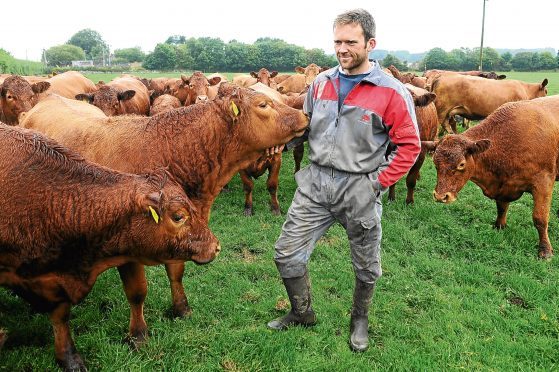An imported “breed” of cattle known as Stabilisers is quietly making its mark on Scottish beef production.
Purists are suspicious or even dismissive of this composite animal that sells itself on statistics, yet supporters claim it is the fastest growing breed in the UK with more than 10,000 cows in 110 herds.
The Stabiliser’s origins are in a US Department of Agriculture-designed four-way cross that combines Red Angus, Simmental, Gelbveigh and Hereford genetics to produce an animal that benefits from hybrid vigour. The Yorkshire-based Beef Improvement Grouping Ltd (BIG) owns the Stabiliser trademark in the EU and has been selling the genetics here since 2000.
Individual lines are produced in the United States, exported as embryos then multiplied by nucleus breeders in the UK. Bull sales are controlled by the breeding company. Sires cost £2,500-£8,000, with prices based on a bull’s genetic merit, or Estimated Breeding Value (EBV).
The Stabiliser movement is popular in the US, and farmers in the UK who use the cattle swear by their results, particularly as an efficient suckler cow.
Early converts include the Norrie family who farm at Denhead of Arbirlot near Arbroath. They are so convinced by the breed they are hosting a farm walk and talk by breed mastermind, Lee Leachman next week.
Douglas, Frank and Robin Norrie were amongst the first in Scotland to import Stabilisers in the late 1990s, originally to use as a maternal line to put to Charolais bulls, but in 2006 they bought a Stabiliser bull and now run a closed herd of 140 animals.
“We were certainly the farthest north Stabiliser breeder in those early days and at that time our herd was made up of cows of 57 varieties which we had bought out of auction marts as bulling heifers or with calves at foot,” said Douglas Norrie . “That wasn’t working for us and one of the main reasons was the need to get rid of diseases, particularly BVD and Johne’s. We joined the HI-Health Scheme and are now on top of those disease issues.”
The Norries sell Stabiliser calves as bull beef at 13-14 months old and surplus yearling bulling heifers are marketed for breeding.
They are now developing a small sub-herd of graded-up to “pure” Stabilisers with which they intend to produce bulls for sale under the jurisdiction of the breeding company.
Robin Norrie said he focused primarily on the breed’s genetics and the bottom-line figures but said it was still important to look at a bull’s locomotion and temperament.
Douglas Norrie added: “We used to worry about heifers not being good mothers, but Stabilisers are very maternal. Calves have low birth weights of 30-40kg. That means we haven’t had to do a Caesarian in 11 years and very rarely have to get the vet.”
*A farm walk and conference takes place at Denhead of Arbirlot, Arbroath, on Monday. Registration is at 4pm followed by a farm walk of the Denhead of Arbirlot herd.
